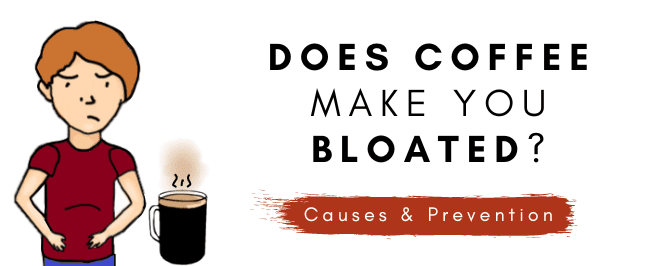I can’t think of a better way to start your day than having a flavorful cup of Joe.
That’s why it was unfortunate when I noticed that I experienced some discomfort after my morning cuppa, which had me wonder does coffee actually make me bloated.
After all, it’s known that this staple caffeinated beverage has a diuretic effect, so it puzzled me why it affected me in such a way.
I was under the impression that my morning cup shouldn’t impact or worsen bloating.
It was only for a short period that I thought it was coffee that led to this unpleasant puffiness and stomach irritation.
I later realized that the lactose in the milk that I was adding was the issue.
Still, even black coffee with no condiments and sweeteners causes bloating in some individuals.
Their stomach gets distended, and some may even feel nauseous after having their morning cup.
This can be quite frustrating for coffee lovers who desperately need their morning dose of caffeine.
After all, feeling bloated and gassy after a shot of espresso may be a deal breaker and can force you to quit for good.
But what should you do? How to actually avoid bloating from coffee? Is caffeine the culprit? Should you switch to decaf or have tea instead?
In this post, I’ll go over the causes of why coffee makes some people puffy. Furthermore, I’ll give you some ideas on how to get rid of coffee bloat.
So let’s dive in!
Does Coffee Make You Bloated?
Coffee doesn’t make most people bloat, and feeling puffy after a cup of Joe isn’t that common.
Furthermore, since there is evidence that it boosts metabolism and promotes fat loss, your espresso or filter brew may even make you feel less puffy.
Moreover, apart from its energizing properties and its ability to enhance your cognitive performance, coffee has been linked to a number of health-promoting effects.
So does coffee actually make you bloated, and could it cause an unpleasant puffy, full, and gassy sensation in your abdomen?
Some individuals are more sensitive to the acidic nature of coffee, or to some of its compounds, such as caffeine.
This can lead to discomfort, such as flatulence (i.e. intestinal gas) and bloating.
Furthermore, coffee may cause or worsen bloating in individuals, who already have chronic indigestion issues (dyspepsia).
People with lactose intolerance would often feel bloated after a cup of coffee with milk.
Moreover, artificial sweeteners that are commonly added to coffee, such as sucralose (Splenda) could also cause bloating, diarrhea, and gas.
Coffee bloat may last for anywhere from an hour to over 3-4 hours, depending on what exactly has provoked it.
Coffee bloat: Causes and Prevention
So yes, unfortunately, your cup of coffee can cause or worsen digestive discomfort and bloating symptoms, such as stomach pain, and gas.
The good news is that once you figure out what provokes this undesired effect in you as an individual, you could get rid of coffee bloat for good.
That’s why I’ll go over the causes of why coffee may make you feel bloated in more detail.
1. You are sensitive to coffee’s acidity.
According to this scientific report, the pH of coffee is generally within the range of 4.85 and 5.13.
If a pH value of a solution is below 7, then it is considered acidic.
Some individuals are more sensitive to acidic foods and drinks, such as coffee. This may be the cause of why you’re experiencing digestive discomfort and bloating after having your morning cup.
Furthermore, there is evidence that caffeine can decrease the lower esophageal sphincter (LES) pressure.
This may lead to aggravation of GERD symptoms, such as acid reflux, heartburn, and excessive belching. Consequently, you may start feeling bloated after having a cup of Joe.
To get rid of coffee bloat, caused by its acidity, you can switch your regular cup with a less acidic alternative, such as cold brew.
Related Post: Is Cold Brew Coffee Less Acidic?
Decreasing your caffeine intake by substituting your second cup of Joe with decaffeinated coffee may also help you avoid bloating.
2. You have digestive issues that are affected by coffee.
During my research, I found that coffee stimulates the secretion and production of gastrin and hydrochloric acid.
These substances initiate the digestion of carbohydrates, proteins, and lipids.
Therefore coffee affects digestion, which can cause bloating and gas in some individuals who have digestive issues.
That’s why people who are diagnosed with functional dyspepsia are often advised to avoid or limit coffee consumption.
The substances in coffee that actually have an impact on digestion are caffeine and some of its polyphenols.
Consequently, limiting the amount of caffeine you’re consuming can help you get rid of coffee bloat.
Therefore, if you often have a second cup of Joe, try switching it to a cup of decaf or half-caff coffee. This way you could reduce bloating and coffee may no longer make you gassy.
Author’s Note: Substituting coffee with tea may not be the best idea for individuals with digestive issues. This is so, as tea may also cause gas and bloating in people with more sensitive stomachs.
It’s also worth noting that some scientific papers report that dark roasted coffee is less effective in stimulating gastric acid secretion.
Therefore you can switch to darker roasts to avoid the puffy feeling and the unpleasant distended stomach sensation after a cup in the morning.
3. You’re having too much caffeine.
As previously discussed, caffeine impacts gastric acid secretion and may worsen GERD symptoms by decreasing LES pressure.
What’s also worth noting, is that caffeine increases cortisol secretion.
Cortisol is actually a stress hormone, and increased levels of cortisol may have an impact on your digestive system. As a result, your digestion may slow down, which could explain why you feel bloated after having a cup of coffee or two.
Therefore, you may want to ask yourself whether you’re having a bit too much caffeine.
According to the FDA, a healthy individual shouldn’t consume more than 400 milligrams of caffeine per day.
Related Post: Which coffee has the most caffeine?
If you’re a passionate coffee lover, you may not be noticing that your daily caffeine intake exceeds the maximum recommended amount.
Moreover, some individuals who are more sensitive to caffeine may experience the negative consequences of caffeine overconsumption after their second cup for the day.
Therefore, it may be a good idea to start monitoring how much coffee you’re actually having. You could stick to drinking just 1 cup of caffeinated coffee per day and have the others substituted with decaf or half-caff coffee.
Related Post: Why doesn’t coffee wake me up?
Switching your second cup of coffee with green tea or matcha may also be a good idea if caffeine is the culprit for your coffee bloat.
This is so, as tea contains l-theanine, which affects the way caffeine works on us. You can learn more about this in my matcha versus coffee comparison article.
4. You are lactose intolerant.
Around 36% of people in the United States have lactose malabsorption. Lactose intolerance often develops at a later age.
Therefore it may seem surprising to you that your morning latte suddenly causes lactose intolerance symptoms, such as stomach bloat, gas, diarrhea, or an overall feeling of sickness.
To get rid of these unpleasant effects, try having your coffee black, without any milk. This way you would see whether lactose is the culprit for your feeling of being bloated.
You could also order your latte or mocha beverage vegan instead.
In other words – substitute regular milk with almond, soy, oat, or another lactose-free alternative.
5. You’re adding sweeteners to your coffee that cause bloating.
If you’re trying to limit your carbohydrate intake, but you can’t have your coffee unsweetened, the sugar substitute you’re adding may cause digestive issues and bloating.
Artificial sweeteners, such as Splenda may cause stomach problems, such as diarrhea, gas, and a distended stomach.
Even if the sweetener you’re using isn’t artificial, it may still be the culprit of why coffee makes you puffy.
For example, people who are on a keto diet would have their coffee sweetened with erythritol.
This is a natural sweetener, but some individuals with more sensitive stomachs may experience negative side effects. These include cramps, bloating, and gas.
Stevia, which is another natural sweetener that is often added to coffee, may also cause similar digestive issues in some consumers.
Furthermore, since these coffee condiments are virtually free of calories, they’d often be added in excess. So even if you don’t have a sensitive stomach, you may experience bloating and flatulence after having your sweetened coffee drink.
Therefore, you should ask yourself whether you’re going overboard with the sugar-free coffee syrup you’re adding. After all, this may explain drinking coffee bloats you.
The best approach to limiting coffee bloat, caused by the addition of sweeteners, is to have your coffee unsweetened.
I know that this sounds a bit ambitious to those who feel like coffee is too bitter on its own.
Nevertheless, you may find that switching to specialty coffee beans is a great alternative. Coffee of a higher grade would always have a better taste and a more complex and pleasant flavor on its own.
Cold brew coffee is also known to have a smoother flavor with lower perceived bitterness and acidity. So you may want to start using your French Press for making cold brew coffee instead of your regular hot brew.
Another unusual approach to drinking your coffee unsweetened would be to have it with a few grains of salt, which would reduce its bitterness.
Related Post: Sweetening coffee with honey: Is it actually better?
Final Words
I hope that you found my post helpful and that you have a better idea of why coffee makes you bloated.
You can try out some of my tips on how to prevent this unpleasant puffy and gassy feeling.
Once you figure out what actually provokes the bloated sensation in your stomach, you could try making adjustments that will prevent this from happening.
Limiting your caffeine consumption, switching to cold brew or darker roasts, avoiding lactose in your cup, or limiting the amount of sugar substitutes you’re adding could prevent bloating. So try what works best for you and share your experience in the comment section below!

